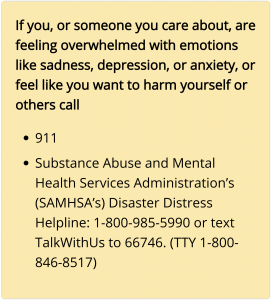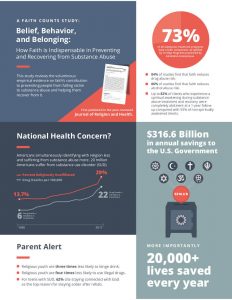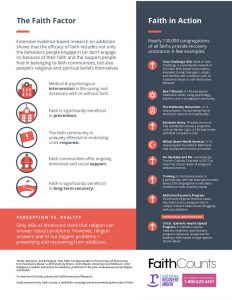People with substance use disorders are especially vulnerable during the coronavirus crisis
By Brian J. Grim, Ph.D.
This is part of a daily blog by RFBF President Brian Grim highlighting positive business responses to the pandemic, and part of the COVIDxNOW Global Economic Leaders Consortium, which is seeking to deliver innovative solutions for COVID19
Stress and Coping
 The outbreak of coronavirus disease 2019 (COVID-19) is stressful for many people. Fear and anxiety about a disease can be overwhelming and cause strong emotions in adults and children. People who have mental health conditions including problems with substance use may respond more strongly to the stress of a crisis, according to the CDC and news reports.
The outbreak of coronavirus disease 2019 (COVID-19) is stressful for many people. Fear and anxiety about a disease can be overwhelming and cause strong emotions in adults and children. People who have mental health conditions including problems with substance use may respond more strongly to the stress of a crisis, according to the CDC and news reports.
If you, or someone you care about, are feeling overwhelmed with emotions like sadness, depression, or anxiety, or feel like you want to harm yourself or others, the CDC urges you to call 911. Also, the Substance Abuse and Mental Health Services Administration’s (SAMHSA’s) Disaster Distress Helpline: 1-800-985-5990 or text TalkWithUs to 66746. (TTY 1-800-846-8517). Also, a growing number of recovery support groups are going online during the crisis.
Faith and Recovery
Adding to the stress is that one source of support to stay sober is being cut off by stay-at-home orders and social distancing — access to their faith-oriented support groups. This is of special concern based on a recent Faith Counts study that my daughter (Melissa Grim, J.D., MTS) and I published in the Journal of Religion and Health.
Belief, Behavior, and Belonging: How Faith is Indispensable in Preventing and Recovering from Substance Abuse
Key findings:
- — Faith Reduces Risk, Helps Long-Term Recovery, Saves Lives
- — Provides $316 billion annually in savings to U.S. economy
- — Authors Warn that Declining Religiosity is National Health Concern
- — Perception that Religion Can’t Answer Today’s Problems Don’t Match Reality
Download 2-page summary with graphics
 At any given time, there are 20 million Americans afflicted with a substance use disorder (SUD). And tragically, each year, about 158,000 die from alcohol or drug-related deaths. However, as we head further into National Recovery Month, one of the most effective tools to prevent and/or recover from addiction is often overlooked— faith. And when it comes to long-term recovery, faith-based programs are a driving force.
At any given time, there are 20 million Americans afflicted with a substance use disorder (SUD). And tragically, each year, about 158,000 die from alcohol or drug-related deaths. However, as we head further into National Recovery Month, one of the most effective tools to prevent and/or recover from addiction is often overlooked— faith. And when it comes to long-term recovery, faith-based programs are a driving force.
To view the full report, click here, or for a two-page summary, click here.
The study found that 73% of substance abuse treatment programs incorporate spiritual components such as 12-step programs. And congregations, through their support of recovery programs, provide $316 billion in savings to U.S. economy every year, the study shows.
“Belief, Behavior, and Belonging: How Faith is Indispensable in Preventing and Recovering from Substance Abuse” is the second in a series of studies from Faith Counts, a nonprofit, multifaith organization aimed at promoting the value of faith.
“In our review of hundreds of studies and extensive data, we found that religious beliefs, behaviors and belongings significantly reduce risk of substance use and significantly help recovery,” states Dr. Grim.
Dr. Grim also emphasizes, “while in the latest Gallup survey only 46% of Americans think that religion can answer today’s problems, the reality is that religion provides answers for one of today’s biggest problems – addiction.” Part of the misperception revealed by Gallup is that fewer people are affiliated with religion today, resulting in less experience with faith and its positive impacts. Indeed, the study concludes that the decline in religious affiliation presents a growing national health concern because the growth of disaffiliation is concentrated among Millennials and young adults, who are also the highest percentage of any age group to have a substance abuse disorder. “In a sense, the antidote is being rejected by the very people who need it most,” said Dr. Grim.
T he study looked at various data to see if there is any connection between religiosity and recovery and what it found was remarkable: Those with strong religious beliefs are as much as eight times less likely to use illegal drugs, and as much as five times less likely to binge drink.
he study looked at various data to see if there is any connection between religiosity and recovery and what it found was remarkable: Those with strong religious beliefs are as much as eight times less likely to use illegal drugs, and as much as five times less likely to binge drink.
Nearly 90% of studies find that faith reduces alcohol abuse risk and 84% of studies show faith reduces drug abuse risk, according to Dr. Grim’s research, while less than 2% show religion contributes to substance use disorders. It is clear that religion and spirituality—which the study refers to collectively as faith—are exceptionally powerful, integral, and indispensable resources in substance abuse prevention and recovery. Religious beliefs, practices, and ministries not only provide succor and solace to those in need; they provide tangible, valuable resources that can help prevent and address substance abuse.
Regarding the current opioid crisis, Dr. Grim is careful to point out that the study is primarily about prevention and long-term recovery from alcohol and certain types of drug addiction. He states, “It is important to note that the opioid crisis presents a different and unprecedented set of challenges that require a unique approach to treatment for substance use disorder that may include medication assisted treatment.” Grim also adds, “Indeed, I want to be very clear that we are not conflating recovery from alcohol and other narcotics with addressing the opioid crisis.”
While overall medical intervention for SUDs is life-saving and critical, this study shows that faith organizations are uniquely capable of providing the “wrap-around” care and community necessary for long-term recovery.
Kerry Troup, communications director for Faith Counts, states, “We at Faith Counts see this study as yet another positive proof point of the tremendous social good that individuals and organizations of faith provide for society.”
The research shows that the efficacy of faith includes not only the behaviors people engage in (or don’t engage in) because of their faith and the support people find in their belonging to faith communities but also people’s religious and spiritual beliefs.
What others are saying about the study
“This study presents a comprehensive review of the literature on faith and substance use, and most importantly, provides a recent analysis of the SAMHSA database to determine the prevalence of faith-based substance abuse recovery programs and the tremendous cost savings that such programs provide to our country and health system.”
-Dr. Harold Koenig, M.D., Professor of Psychiatry and Behavioral Sciences and Associate Professor of Medicine, Director, Center for Spirituality, Theology and Health at Duke University Medical Center
“Faith-based organizations work tirelessly to address difficult social problems like homelessness, crime, and prisoner reentry. In spite of this fact, faith-based groups rarely receive recognition for their positive and valuable contributions. Brian Grim has done us all a big favor by producing a study that documents the enormous and beneficial impact of faith-based substance abuse programs.”
-Dr. Byron R. Johnson, Professor of Social Sciences and Director of the Institute for Studies of Religion at Baylor University
NATIONAL HEALTH HOTLINE: 1-800-622-4357
External: Learn more about substance abuse resources for veterans with this useful guide.
LINK TO STUDY IN JOURNAL OF RELIGION AND HEALTH
ABOUT FAITH COUNTS
Faith Counts is a nonprofit, multifaith organization with the sole mission to promote the value of faith. The centerpiece of Faith Counts is a social media campaign that tells powerful stories about how faith counts—how it inspires, empowers, motivates and comforts — and how faith is invaluable in helping to solve many of society’s problems.
Facebook: Facebook.com/MyFaithCounts
Instagram: Instagram.com/MyFaithCounts
Website: FaithCounts.com
Twitter: @MyFaithCounts
Faith Counts partners include a diverse faith community, including: The Salvation Army, Episcopal Migration Ministries, the Hindu American Foundation, Sikh American Legal Defense and Education Fund, U.S. Conference of Catholic Bishops Committee for Religious Liberty, Seventh-Day Adventist Church, Hillel International, The Church of Jesus Christ of Latter-day Saints, the 1st Amendment Partnership, and the Franciscan University of Steubenville. All faith groups are welcome.
ABOUT THE AUTHORS
Brian Grim is a non-resident research scholar at the Institute for Studies of Religion at Baylor University and president at the Religious Freedom & Business Foundation and has a doctorate from Penn State University. He previously was director of cross-national data at the Pew Research Center and a program director at universities in China, the former USSR, and the Middle East.
Melissa Grim, Brian’s daughter, is a senior researcher at the Religious Freedom & Business Foundation and has a master’s in theological studies from Boston University and a law degree from DePaul University in Chicago. Melissa was born in China, raised in the former Soviet Union, and graduated from high school in the Middle East.
The father-daughter duo are also coauthors of the first Faith Counts study, “The Socio-economic Contributions of Religion to American Society: An Empirical Analysis.” Interdisciplinary Journal of Research on Religion, 12, 3.
###

